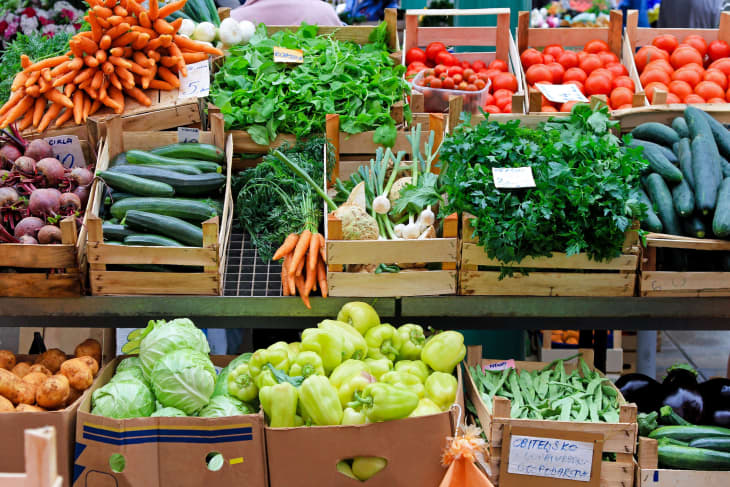8 Grocery Hacks to Make Going Organic Easier on Your Wallet

If you’re one of the 45 percent of Americans who actively try to include organic food in your diet, you know that while organics might be the best fuel we can put into our bodies, it can be quite a drain on a household budget. All it takes is a quick stroll down the organic produce aisle at the grocery store to give you a serious case of sticker shock. For something that is so good for you and good for the globe, it can definitely be bad for your wallet.
But if you believe that the pros far outweigh the con of being costly, here are eight grocery hacks that make it easy—and more affordable—being green.
1. Map Out Local Farmers’ Markets
Spend one Saturday morning at a local farmers’ market and you’ll walk away amazed at how beautiful and budget-friendly the produce is—and big! Farmers know their stuff, and the food they pluck from the dirt and sell to you from their stand will go much farther feeding your family than the relatively puny non-organic store-bought variety. You can find farmers’ markets near you by heading to LocalHarvest.org or USDA.gov.
2. Stalk Your Favorite Organic Food Brands
On social media, that is! Often, brands will alert their followers to fantastic deals and discounts that may otherwise be overlooked. So if you find an organic food brand you love, find out if they are on Twitter, Facebook, or Instagram—if they are, hit the follow button. If they have a newsletter, sign up for it.
3. Clip Coupons
No one is saying you need to become one of those extreme couponers who cleans out their garage to hoard surplus groceries. (Although if you want to do that, more power to you.) But many organic food brands offer coupons you can use to shave at least a few pennies off the cost. You can also let organic couponing sites like All Natural Savings or Organic Deals do the legwork for you.
4. Shop “Scratch and Dents”
Look to see if your local grocery store has a “scratch and dent” section, or if you can find a scratch and dent food store nearby dedicated to carrying slightly damaged boxed and canned goods. These imperfect organics may not look as pretty on the outside as their pristine condition cousins, but they are every bit as good for you and can save you a sizable sum.
5. Throw a CSA or Co-Op Program into the Mix
A great way to ease into organic grocery shopping is to buy into a local co-op or community-supported agriculture (CSA) program. You’ll be pleasantly surprised at how small the price tag for these services are when you consider what you get: a big ol’ basket of fresh organic fruits and veggies straight from a local farm, all delivered right to your door.
6. Buy with a Buddy
So you want to buy a few apples, but the bag of organic apples you put in your cart has far more than you’ll be able to polish off by yourself. So why not rope a friend into your organic shopping excursions? Many organic food items could easily be split between two or more people, meaning you also get to split the costs. Sweet!
7. Purchase Whole, Not Pre-Packaged Parts
Sure, it’s a little more prep work for you in the long run, but buying whole foods instead of pre-packaged parts typically costs less per pound. Plus, let’s say you buy a whole chicken as opposed to a package of breast, legs, or wings – you’ll ultimately have more meat to use with the whole chicken, which you can then freeze for later use or use to make your own chicken broth.
8. Sign Up for All the Loyalty Programs
This includes reward cards, too. When you do this, it’s basically free money, y’all! For example, have you heard of Earth Fare’s Tomato Bank program? For every 100 points you earn buying organic food (and you earn 100 points just for signing up), you get a dollar back. Genius. Same goes for reward cards, since they often accrue bonus bucks or extra money over time you can use towards future purchases.
Do you shop organic? Have any tips to share for going green without spending a lot of green?